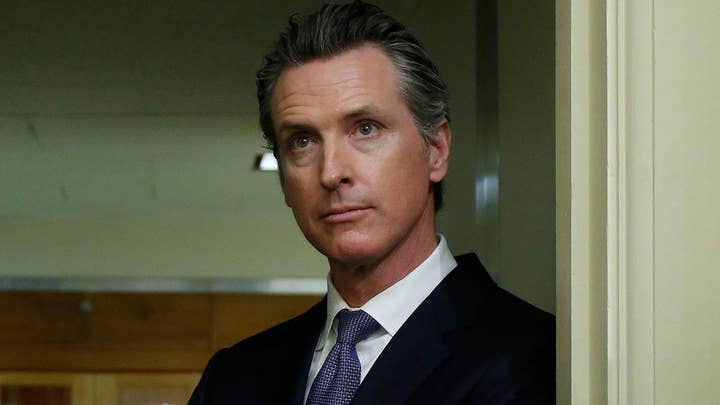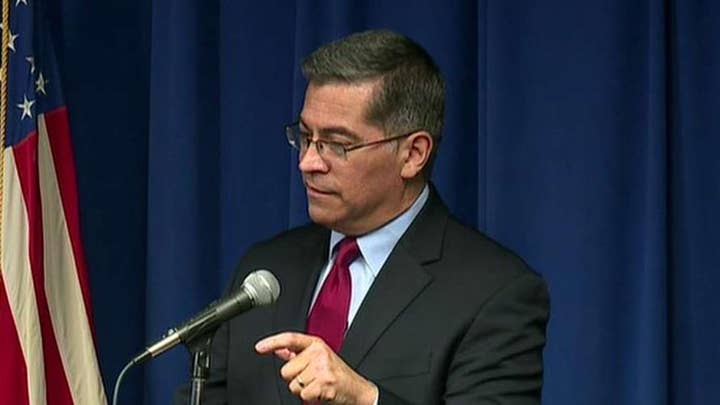
In this Monday Feb. 11, 2019 file photo Calif. Gov. Gavin Newsom answers questions at a Capitol news conference, in Sacramento, Calif. (AP Photo/Rich Pedroncelli, File)
California Gov. Gavin Newsom signed an executive order on Wednesday that put a moratorium on the executions of the 737 inmates currently incarcerated in the Western Hemisphere’s largest death row.
While the order is largely symbolic – California has not executed an inmate since 2006 amid legal challenges – it still marks a major victory for opponents of capital punishment given the state’s size and its national political influence.
“I’ve gotten a sense over many, many years of the disparity in our criminal justice system,” Newsom said during a press conference on Wednesday. “We can make a more enlightened choice.”
Newsom added that as of Wednesday, the equipment used in executions at San Quentin State Prison – the facility where capital punishment was carried out for men in California – was being shut down and removed.
“We cannot advance the death penalty in an effort to soften the blow of what happens to these victims,” Newsom said. “If someone kills, we do not kill. We’re better than that.”
Despite recent polling indicating that support for the death penalty is at its lowest level since the early 1970s, Newsom’s order still bucks the will of most California residents. California voters previously rejected an initiative to abolish capital punishment in the state and instead, in 2016, voted in favor of Proposition 66 to help speed up executions.
“Governor Newsom, who supported the failed initiative to end the death penalty in 2006, is usurping the express will of California voters and substituting his personal preferences via this hasty and ill-considered moratorium on the death penalty,” Michele Hanisee, the president of The Association of Deputy District Attorneys, said in a statement.
NEW JERSEY MANSION MURDERS SPUR CALLS FOR STATE TO REINSTATE DEATH PENALTY
Kent Scheidegger, the legal director for the Sacramento-based Criminal Justice Legal Foundation, called Newsom’s order “a slap in the face of the families of murder victims.” The foundation is in favor of the death penalty and helped draft the 2016 resolution to fast track executions.
“The people have voted for the death penalty eleven times since 1972, including three times in the last seven years,” Scheidegger said in a statement. “The Governor’s decision to grant a blanket reprieve to prevent executions is an abuse of power and a slap in the face of the families of murder victims,” he added.
The move to halt executions was also panned by President Trump, who has been a harsh critic of Newsom's ever since the governor took office earlier this year.
“Defying voters, the Governor of California will halt all death penalty executions of 737 stone cold killers. Friends and families of the always forgotten VICTIMS are not thrilled, and neither am I!” Trump tweeted early Wednesday.
California has executed 13 inmates since the U.S. Supreme Court reinstated the death penalty in 1976 and the state has the most people on death row in the country. Since the 1970s, 79 death row inmates have died of natural causes in the state and 26 by suicide. The last execution held in California occurred in 2006 when 76-year-old Clarence Ray Allen, who was convicted of killing three people, was executed.
Since then a series of stays of execution issued by the Federal District Court in San Francisco have held up any executions in the state, but there are now 25 inmates on death row who have exhausted all of their appeals. Newsom said that none of the inmates currently on death row with have their sentences commuted, but will possibly be transferred back into the state’s general prison population.
CLICK HERE TO GET THE FOX NEWS APP
Newsom defended his right as governor to put the moratorium on the death penalty – citing statistics that there are a number of people on death row who are actually innocent of the crimes for which they’ve been convicted. A 2014 study by the National Academy of Sciences determined that one in every 25 inmates on death row in the United States was sentenced to die for crimes they did not commit.
“I believe I’m doing the right thing,” he said. “I cannot sign off on executing hundreds and hundreds of human beings knowing that among them there will be innocent people.”













































